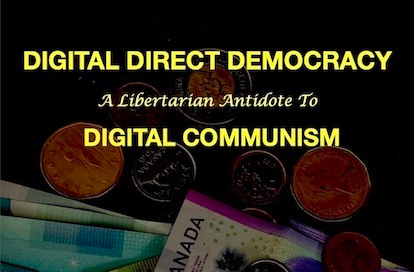Digital Direct Democracy, episode #9 __ CPD STRENGTHS __
The Citizens’ Preferences Database (CPD) is an idea whose time and possibility has come. A “Libertarian” idea, its purpose is to defend and protect individuals from unwanted intrusions by the state.
STRENGTHS
The Fourth Industrial Revolution (4IR) is already well underway. The changes it brings to humanity, for better or worse, are unstoppable. Very wealthy and powerful people and organizations are supporting and guiding its transformative effects on the world.
The age-old adage “if you can’t beat them, join them” is a good strategy in this Digital Age and during the 4IR evolution. The CPD, and the overall direction of the Digital Direct Democracy vision, can be integrated and coexist with the 4IR juggernaut.
Systems integration and interoperability are among the greatest advantages of digital technologies.
The obstacles to realizing these advantages for the CPD are NOT technological. They’re political.
The Citizens’ Direct Democracy idea will need the support of influential people like Dr. Jordan Peterson and groups like The Alliance for Responsible Citizenship (ARC) if it it ever to become a reality in current and future democracies. This explains why the following STRENGTHS must be understood and widely recognized.
CPD: A personal firewall offering individual protection.
As noted in an earlier episode, a Central Bank Digital Currency (CBDC) is coming to Canada. China is said to have the world’s most advanced digital surveillance infrastructure to monitor and “nudge” citizens’ choices and behaviours. Concerns about the CBDC evolution abound because of the state’s opportunity to integrate and impose digital surveillance capabilities on the public using the CBDC infrastructure.
The roll-out of Chinese-like “nudge mechanisms” in Canada is a real possibility, especially given Canada’s current political environment.
By integrating the Citizens’ Preferences Database (CPD) with the CBDC’s architecture and operating infrastructure, the Opt-Out mechanism will provide a democratic firewall to prevent unwanted “nudging” by state authorities.
Digital Direct Democracy prevails when, for example, you Opt-Out of any liability for policies relating to the Climate Change Crisis Theory.
On a practical level, no carbon taxes would ever apply when you pump gas into your vehicle’s tank. Also, no one will have the authority to control how much you purchase.
Best of all, your state-managed “citizen in good standing” scorecard will not be affected. This means that your “rights, freedoms, and state-granted priviliges” could not be curtailed, downgraded or smeared for your choice and purchase of fuel.
CPD: A citizens’ initiative and a personal “insurance policy”.
Citizens’ Preference Database (CPD) proposal was conceived as a building block for Digital Direct Democracy.
Democracy 2.0, and even “Democracy 3.0” and “Democracy 2024”, are topics searchable on the Internet. This belies an enduring recognition that digital technologies can improve human life. Equally understood, in the wrong hands it can bring unwanted consequences to individuals and groups of citizens.
The greatest single STRENGTH of the CPD is that it’s entirely a citizen’s initiative. It’s NOT one conceived and controlled by powerful national institutions like the Canadian federal government and the Bank of Canada, or international entities like the WEF, the World Health Organization (W.H.O) and the United Nations.
The CPD provides a way for Canadians to safeguard themselves against adverse consequences stemming from the ever-expanding domestic and global Digital State.
CPD: A safeguard against authoritarian decrees.
In any national democracy, the mere assertion by public leaders that they are acting to defend and protect citizens from alleged harms and aggression—whether intentional or not—no longer suffices. Blind trust in such claims by citizens is insufficient.
The CPD can be considered a citizen’s insurance policy against the autocratic imposition of unacceptable and undesirable public policies such as “national emergencies” or “global boiling”.
Freedom of informed choice in all areas of life.
Imagine a scenario in which citizens can voluntarily opt out of various government programs and shield themselves from related taxes and the associated legislative and regulatory machinery of state authority.
The CPD opt-out mechanism mirrors the freedom of informed choice that citizens currently exercise daily when interacting with private sector providers of goods and services.
There is no common sense reason why this freedom of choice shouldn’t extend to allow non-governmental service providers to compete with the currently shielded and excessively privileged government monopolies on a fair, unbiased basis.
An Economic “revival” and a catalyst for greater prosperity.
By registering their preferences on the SPD, citizens can unlock a wealth of options, competitive pricing, enhanced service levels, and unparalleled convenience. This, of course, requires the wholesale repeal of all existing laws and regulations that prevent truly competitive markets from taking hold and expanding in the domain of ‘public services’.
Economic growth is the most likely consequence of the CPD and requires ‘pro-competition’ legislative changes.
Older, staid, impersonal, expensive, ineffective and bureacractic institutions will shed human resources by the tens of thousands as their tax revenues decline.
Former government workers will find new ways to earn a living and serve citizens from within a market composed of many modern, injocatove and dynamic non-governmental services enterprises.
In summary, the CPD represents a powerful tool for personal liberty within a broader digital governance paradigm that is certain to evolve. Digital Direct Democracy shows the path forward for individuals to empower themselves to:
Pro-actively manage their interactions and relationships with public institutions as modern digital economies evolve and new possibilities arise.
Engage their ‘informed agency’ in ways that promise to continually improve prosperity within the ever-evolving digital landscape.





https://www.theepochtimes.com/business/robert-f-kennedy-jr-issues-dire-warning-on-cbdc-adoption-5613970